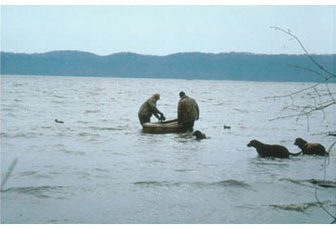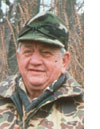
1940 Armistice Day Storm: Harold Hettrick's Story
Speaker: Harold Hettrick
Recorded July 2, 1998 in Washington, D.C. during “Hunting Stories,” a narrative session held as part of the Smithsonian Folklife Festival
Session moderated by Mark Wagler
Listen to the narrative (WAV file) or (MP3)
Don't have an audio player? Download free players -- Windows Media Player or RealOne Player (look for the "Free RealOne Player" link).
Print friendly version of this transcript.
Harold Hettrick:
When I was a young lad in high school, November 11, 1940, Armistice Day, the weather started out very beautiful. Got up to 72 degrees along the Mississippi River and other waterfowl places in the state of Wisconsin. The weather at noon was still warm, and quiet. Hunters had gone out with broadcloth or canvas shirts and canvas jackets.
The weather started to deteriorate. The wind came up first. And the shooting got good. Hunters were going for their limits, which were big limits in those days. They didn’t pay that much attention to the ferocity of the wind until all of a sudden it was 4 o’clock. Then it was too rough to go back. That was when the hunting season closed everyday at that time, 4 o’clock. So they were stranded out there, many in hip boots and waders and small skiffs, small boats, in marshes or on shallow islands above the water line. The wind was coming over, bringing the waves over these islands and these marshes, and as 6 o’clock came, it was sub-zero. They were freezing. They were sheets of ice.
Those who were a little better prepared mentally tried to get to higher ground, an island with a tree on it or something, and gather marsh grass and stick it down their hip boots, their waders, in the sleeves of their jackets, and build a nest in their boats by tipping their boats on the side and huddling in and trying to maintain their warmth. Those who were less fortunate that didn’t get in, they just froze.
 Duck hunters on the Mississippi River with skiff, decoys and dogs.
Photo by Ruth Olson |
The next morning, a pilot…well, I’ll tell you just a little bit more.
I was a kid, I said, in high school. We got home from school at 4 o’clock and the storm was really kicking up and everybody said, “Well, we got hunters out.” And we had a lot of duck hunters in those days. So everybody responded to the riverbank, seeing if they could help hunters get in. Or seeing if they could get a larger boat out to go rescue ‘em. The only ones who had big boats were the commercial fishermen and they even couldn’t get off from shore. They couldn’t get enough momentum to head into the waves.
So those hunters were out there all night. They froze stiff in the ice, those that were in the water. And a pilot from Winona, a real famous pilot in his later years, he was called “The Flying Grandpa,” Max Conrad, flew over the river at dawn the next morning and tried to locate hunters which had survived and also located the hunters that looked like they were dead and direct the rescue parties at ‘em.
That storm on the Mississippi River and in the Wisconsin, Minnesota and Iowa marshes, and I believe there were some as far south as Savannah, Illinois, took 93 hunters. But there were hundreds that survived. I know some of the hunters that survived. My grade school teacher’s father, 76 years old, a gentleman named Kling from Augusta, he was out there hunting. And he was a good woodsman so he protected himself by picking marsh grass and making a nest for himself.
There was a lawyer, a young lawyer right out of the university law school who married my neighbor’s daughter about the previous year. And she was expecting a baby. And Marv was a good river rat. Because it was a holiday, he didn’t have to go to court and practice law so he went hunting. And he got stuck out there in a skiff, much like the one I have up by my hunting camp, except his was wood. He knew his wife’s situation so he tied his gun, his decoys in his boat, the ducks he had killed, he tied those in. Then he rolled the skiff upside down and climbed in and held on underneath this air pocket and waded out to deeper water towards shore where the wind picked the boat up and him and moved him to shore. He’d have never made it right side up but he made it upside down hanging on in the water. And there was an old, older lady named Cookwell who lived on the shore where he had started out from and she was worried about him. So she had a roaring fire going and she was walking the shore along with the rest of us waiting to help a hunter come in and when he came in, his boat came in and we didn’t know there was a body with it! So we went and pulled the boat up on shore and out of it climbs Marv Fugini. And he was literally a frozen ice stick. We couldn’t bend him to walk because his clothes were stiff. So we drug him. And that older lady Mrs. Cookwell, she really drug. She did much of the pulling. We got him into the kitchen (with the) stove and he thawed out and he went on to the hospital that night and his wife delivered him a son. That’s a true story. And those are people I know who survived it up there.
Also hunted for years with an FBI agent who is now dead, but he was out on an island and he didn’t get rescued until the next noon. He was down off of DeSoto and Ferryville and he was on a channel island close to Iowa. And the next morning, a commercial fisherman out to see who he could help found him and some other of his hunters and brought them in.
But that’s one of the causes of concern with water and the cold time of the year when the weather is really building up a blow, which every duck hunter wants. He waits years to get the right blow so he can have good hunting. But there’s the hazard factor. Now today we have better weather forecasts, so we’re a little better off. We have better floatation in our boats; we have better clothing to wear, clothing like the fleece that can be wrung out and put back on and maintain warmth. We have float coats that are life preservers and camouflage gear that give you a little better chance.
But every three years on the part of the river I hunt we lose three hunters. And they’re usually in the same boat. They overload a boat and then they make the mistake of heading into the wind, and they usually have these chisel bottom, chisel bow, flat bottom boats and they have so much gear that one of the hunters has to sit up on the bow. And when they come into the wind, they work just like a chisel. They go nose down. And I’ve seen that happen there. And by the time you get a boat off of the Wisconsin shore and go across two and a half, three miles of river, you can’t recover them. I mean, it’s too late. So there’s a hazard to it. But the hazard doesn’t stop people, it should just make them more careful.
NOTES
This narrative comes from Side B of cassette tape “Wisconsin Talk, 7/2/98, Tape 2,” located at approximately 085-176 on counter.
Tape housed at the Wisconsin Arts Board.
Other tape contents:
Side A: “Ice Fishing” with festival participants Brooks Big John, Mary Lou Schneider, and Bill Casper. Wisconsin Program staff folklorist Bob Teske moderated the session.
Side B: “Hunting Stories” with festival participants Harold Hettrick and Tim Smits. Wisconsin Program staff folklorist Mark Wagler moderated the session.
 Harold Hettrick has been an avid duck hunter for most of his life. Now retired, his work as a conservation warden for the Wisconsin Department of Natural Resources took him to some of the best waterfowl hunting areas in the state, including Horicon Marsh and Green Bay. His own hunting has centered on his duck camp in Ferryville, on the Mississippi River south of LaCrosse. Harold shares his extensive knowledge of good hunting techniques and practices with younger hunters who frequent his duck camp and who have Black Labradors descended from Harold’s own dogs.
Harold Hettrick has been an avid duck hunter for most of his life. Now retired, his work as a conservation warden for the Wisconsin Department of Natural Resources took him to some of the best waterfowl hunting areas in the state, including Horicon Marsh and Green Bay. His own hunting has centered on his duck camp in Ferryville, on the Mississippi River south of LaCrosse. Harold shares his extensive knowledge of good hunting techniques and practices with younger hunters who frequent his duck camp and who have Black Labradors descended from Harold’s own dogs.






